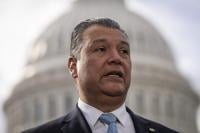
President Donald Trump on January 20 as he signed executive orders. (Photo by Melina Mara-Pool/Getty Images)
On Monday, just hours following his inauguration, President Donald Trump signed an executive order ending birthright citizenship. However, the move faces significant legal hurdles: altering birthright citizenship would require either a constitutional amendment or a landmark ruling from the courts.
The 14th Amendment guarantees citizenship to those born on U.S. soil, and any attempt to change that would be a violation of the constitutional framework that has governed American citizenship for over 150 years.
The executive order, however, argues that the Fourteenth Amendment has never been interpreted to extend citizenship universally to everyone born within the United States. It contends that U.S. citizenship is not automatically granted to all individuals born on American soil, but rather is limited to those “subject to the jurisdiction” of the U.S. Historically, this provision has excluded certain groups. Specifically, individuals born in the U.S. are not granted citizenship if:
The mother was unlawfully present in the U.S. and the father was neither a U.S. citizen nor a lawful permanent resident at the time of birth.
The mother was lawfully but temporarily in the U.S. (e.g., under a tourist or student visa) and the father was not a U.S. citizen or lawful resident.
So the question remains: how real is the threat posed by Trump’s interpretation of the Constitution to the roughly 1.3 million U.S.-born adults who are children of unauthorized immigrants?
FACT CHECK: Ending birthright citizenship could* be accomplished through a constitutional amendment. However, that would require a two-thirds majority vote in both the House and Senate, as well as approval from three-quarters of the states—an arduous and unlikely process.
While the president can direct federal agencies, like U.S. Immigration and Customs Enforcement (ICE), to interpret citizenship more narrowly, such a move would likely spark legal challenges from individuals whose citizenship is questioned. This could set off a protracted court battle, potentially reaching the U.S. Supreme Court.
Although Trump’s executive move has incited panic through the country’s immigration system, it is legally impossible for a sitting president to abolish birthright citizenship unilaterally. The issue is a complex one that hinges on constitutional law—and any effort to end the right would ultimately have to be settled in the courts, not by a stroke of the president’s pen.
HISTORY: The concept of birthright citizenship in the United States originates from the 14th Amendment, ratified in 1868, which was designed to ensure the citizenship of formerly enslaved people following the Civil War. The amendment’s Citizenship Clause reads:
“All persons born or naturalized in the United States, and subject to the jurisdiction thereof, are citizens of the United States and of the state wherein they reside.”
This provision has been interpreted for over a century as granting citizenship to nearly every person born on U.S. soil, regardless of the citizenship or immigration status of their parents. While there are some exceptions (such as children of foreign diplomats or enemy combatants), the overarching principle remains clear: birthright citizenship is a fundamental right enshrined in the Constitution.
Trump’s executive order targets the phrase “and subject to the jurisdiction thereof” in the 14th Amendment, aiming to clarify that children born in the U.S. to undocumented immigrants would no longer automatically receive citizenship.
FACT CHECK: The Supreme Court has historically upheld birthright citizenship.
In cases such as United States v. Wong Kim Ark (1898), the Court ruled that the children of Chinese immigrants born in the U.S. are entitled to citizenship under the 14th Amendment, reinforcing the principle of birthright citizenship.
Historically, the U.S. Supreme Court has been the final arbiter of constitutional questions. In the case of birthright citizenship, the issue would almost certainly be taken up by the courts. Any executive order to end birthright citizenship would almost immediately be challenged in federal court. Legal experts argue that the courts, especially the U.S. Supreme Court, would likely reaffirm the Constitution’s guarantee of citizenship for all born on American soil.
While the current Supreme Court makeup leans conservative, it also tends to be cautious in overturning long-standing precedents unless there is a compelling reason. Overturning birthright citizenship would represent a significant departure from well-established legal interpretations and could have wide-ranging consequences. The Court might hesitate to make such a sweeping change, especially if it would be seen as a radical departure from precedent.
FACT CHECK: There are limits to executives powers, even for the President
The Constitution does not grant the president the authority to unilaterally change or amend its provisions, and that includes altering the guarantees outlined in the 14th Amendment. Presidents, no matter their political power or agenda, are bound by the Constitution, which is the supreme law of the land.
A president's executive orders are designed to implement and enforce existing law—not to create new laws or invalidate constitutional rights. An executive order aimed at ending birthright citizenship would not only violate the clear text of the 14th Amendment but also face immediate legal challenges in the courts.
President Trump, like all U.S. presidents, cannot rewrite the Constitution with an executive order, no matter how high the stakes. Any attempt to change birthright citizenship would not only be a breach of constitutional text but would invite an inevitable showdown in the judicial system, where a ruling could take years to resolve.
For now, birthright citizenship remains a cornerstone of American democracy, protected by the Constitution and subject to judicial review. Any attempts to change it will be put to the test. In the end, it will be the courts, not the Oval Office, that will decide its fate.











(0) comments
Welcome to the discussion.
Log In
Keep it Clean. Please avoid obscene, vulgar, lewd, racist or sexually-oriented language.
PLEASE TURN OFF YOUR CAPS LOCK.
Don't Threaten. Threats of harming another person will not be tolerated.
Be Truthful. Don't knowingly lie about anyone or anything.
Be Nice. No racism, sexism or any sort of -ism that is degrading to another person.
Be Proactive. Use the 'Report' link on each comment to let us know of abusive posts.
Share with Us. We'd love to hear eyewitness accounts, the history behind an article.